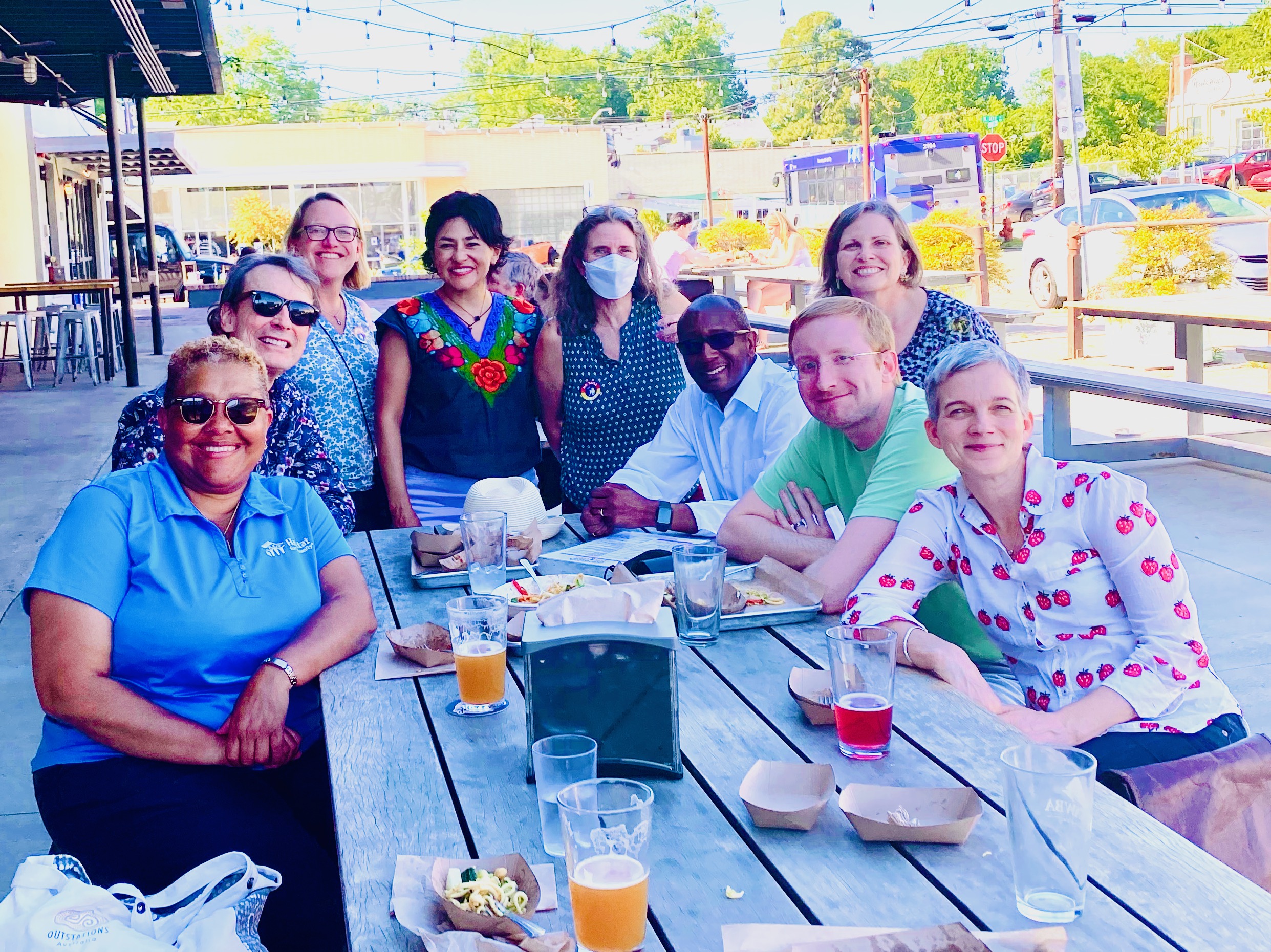Based on a report by Elizabeth Shapiro-Garza and Leslie Parkins, CESC Co-directors
Community-engaged scholarship, partnerships between the community and university to co-create knowledge through research and teaching, can be a powerful way to address issues of shared importance. The Community-Engaged Scholarship Collaborative (CESC) was launched in the 2021-2022 academic year to cultivate a community of practice among Duke faculty, staff and community partners. One year in, the group is evaluating its impacts created by providing learning opportunities, direct funding and coordination of engaged-scholarship resources within Duke.
Learning and Fellowship
The Collaborative serves as a convener for community-engaged scholars by providing opportunities for learning and fellowship for Duke faculty and staff and their community partners. In its first year, a series of 5 lunch-and-learn sessions featured Duke and community scholars discussing their partnership and the power and challenges of this approach. A workshop series taught applied skills and best practices in equitable, reciprocal, and impactful community-university partnerships. The spring Community Engaged Scholarship Symposium, organized in collaboration with the Duke Clinical and Translational Science Institute – Community Engaged Research Initiative, topped off the year by celebrating and increasing the visibility of engaged scholar partnerships from across the campus and health systems. Another new Collaborative program, the Fellowship in Community-Engaged Scholarship, offered a more structured and intensive way for Duke faculty, staff and their community partners to learn together and form a strong community of practice and support. 12 Fellows were mentored by four Duke faculty and community leaders.

“So grateful for your time and expertise! This was one of the most valuable seminars I have taken in recent memory.”
Community workshop participant

Impact Story: WaSH-AID Benefits from Engaged Scholarship

Mara Shurgot, associate director of communications at Pratt School of Engineering’s Center for Water, Sanitation, Hygiene and Infectious Disease (WaSH-AID) was one of the 12 inaugural fellows. WaSH-AID develops and promotes sanitation and wastewater treatment solutions appropriate for low-resource communities around the globe, but was looking for ways to engage locally as well. Mara came into the program with little experience in community-engaged scholarship but with a great interest in learning and applying best practices.
(I learned) the importance of not coming into a community with the goal of “fixing” something that the community may not perceive as needing to be fixed…
Mara shurgot, reflecting on her fellowship
While she faced challenges along the way, Mara used the fellowship program to make community connections and to learn how to form and navigate authentic partnerships to meet identified community needs. She was able to connect with a community activist in East Durham, Charlitta Burrus Banks, who was working with families using Edgemont Park off Angier Avenue to improve services and facilities. In collaboration with Durham Parks and Recreation, Mara and Ms. Burrus Banks brought people together to install a sink in the park, plant a water garden where it drained and cover it with children’s artwork to create a sense of ownership and discourage vandalism. Watch a video of the WaSH-AID project.
Increasing Capacity
The Collaborative also provided grant funding to increase opportunities for faculty and staff at Duke and their community partners interested in building capacity for effective practices in engaged scholarship. During the 21-22 academic year, 9 projects were funded that built on strong university-community partnerships to address issues such as access to early childhood education, environmental justice, housing and food insecurity, and health service equity for the formerly incarcerated and low-resource families.

Impact Story: Arraigados Juntos – Rooted Together
A collaboration between La Iglesia Emanuel and Duke’s Root Causes’ Fresh Produce Program, the Arraigados Juntos – Rooted Together project created a community learning center to better support the needs of children in Durham’s Latinx community by providing direct social support, outreach, and education.

Miguel Rubiera, Volunteer Program Manager at La Iglesia Emanuel, and Esko Brummel, the Assistant Director of Education of Duke Science and Society and co-founder of the Root Causes fresh produce distribution program through the Duke School of Medicine, applied together for both the Fellowship program and project funding. They had worked together previously to support the food bank program at La Iglesia Emanuel that Miguel and his wife had started, but wanted to revitalize and evaluate the effectiveness of a tutoring program for the Latinx students associated with the church.
“The community engaged scholarship grant has been instrumental in allowing us to restart our learning center.”
Miguel rubiera, rooted together founder and grant recipient
The project received $12,000 In funding through the small grants program for both basic program infrastructure (chairs, desks, technology), stipends for instructional staff and to cover transportation and other costs that might otherwise prove to be barriers to participation. Although the start date for the program was somewhat delayed due to the ongoing impacts of the pandemic. With the basic program infrastructure and funding in place, they were able to work with Duke faculty to recruit students to serve as tutors. Watch a video of the Arraigados Juntos project.
Community-Engaged Scholarship Collaborative Campus Partners
The Collaborative is built upon a network of partner organizations across the Duke campus and health systems who provide engaged scholars with funding, training and consultation as well as assistance in identifying and connecting with new community partners. You can find out more about each of the Collaborative Campus Partner organizations and the types of support they provide here.






